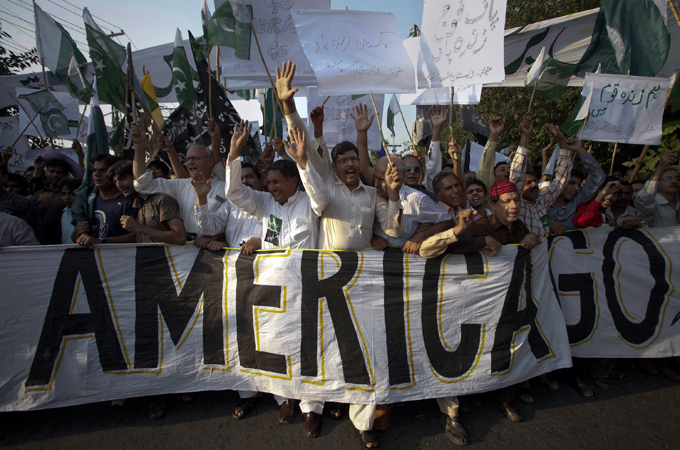Pakistan rejects US demand to attack Haqqanis
Political leaders dismiss allegations against ISI with statement calling for peace with Afghan fighters.

 |
| Pakistan has warned that the US risks losing an ally if officials keep publicly criticising the country [Reuters] |
Pakistani politicians have rejected US allegations that its military was supporting the Haqqani network and have thrown their support behind the country’s most powerful institution in its diplomatic confrontation with the US.
The claims by Admiral Mike Mullen led to a crisis-like atmosphere in Islamabad, with fears of US military action uppermost in many minds.
Yousuf Raza Gilani, Pakistan’s prime minister, summoned the country’s political party leaders to a meeting to discuss the US claims about the country’s spy agency, the Inter-Services Intelligence Directorate, or ISI, and perceived threats of an attack.
They agreed to a vaguely worded resolution late on Thursday that called for peace with fighters in Afghanistan, an apparent rejection of US demands that the Pakistani army attack the Haqqani network.
In a perceived effort to relieve tensions between US-Pakistan relations, President Barack Obama did not endorse Mullen’s comments, instead choosing to state that the intelligence on the nature of the relationship between the ISI and the Haqqani network is “not as clear”.
“The intelligence is not as clear as we might like in terms to what exactly that relationship is,” Obama said on Friday in a radio interview.
“But my attitude is, whether there is active engagement with Haqqani on the part of the Pakistanis or rather just passively allowing them to operate with impunity in some of these border regions, they’ve got to take care of this problem.”
A message of reassurance, that “there will be no [US] boots on the ground” in Pakistan, was communicated to [the Pakistanis]”, an unnamed senior US official told the Reuters news agency on Friday.
Main enemy
The Haqqani network, which is reportedly based in Pakistan and has close relations with the Taliban, are thought to have introduced suicide bombing to Afghanistan.
US officials say the group is based on the Pakistani side of the border and is responsible for much of the violence in Afghanistan.
They have long talked with Islamabad about links between Pakistan and the Haqqani network, but those discussions were mostly held in private, in the hope that the South Asian country could gradually be persuaded to sever the purported ties with the group.
But Mullen, American’s most senior military official, seemed to signal a new approach with his claims made last Friday, calling the Haqqani network a “veritable arm” of the ISI.
‘Baseless’ allegations
Pakistani officials responded to Washington’s change in tone with Thursday’s resolution, saying Mullen’s comments were “baseless” and hurt the country’s co-operation with the US, echoing the line taken by the government and the army.
The resolution went on to say the US should seek dialogue with Pakistanis in the tribal regions close to Afghanistan, in a reference to fighters there battling the Pakistani state.
Such a position has long been popular with religious parties, whose rhetoric paints the US – not the Taliban and al-Qaeda – as the main enemy facing the country.
Few expected the delegates to stake out a position that challenged the army, which largely formulates the country’s foreign policy, so their rhetoric was mostly symbolic.
Still, it was a signal to the US that the country’s elected representatives supported the military, and as such will do nothing to ease strains with the US.
The resolution also referenced veiled US threats of unilateral action against the Haqqanis if Pakistan does not act, saying the “the Pakistani nation affirms its full solidarity and support for the armed forces of Pakistan in defeating any threat to national security”.
Suspected US drone attack
The Islamabad meeting was addressed by Lieutenant-General Ahmed Shuja Pasha, the head of the ISI, who was quoted as saying that his organisation was in contact with the Haqqani’s “political wing”.
“The ISI chief explained that Haqqani network has three or more wings and we have no links with its militant wing but we keep liaison with its political wing for peace in Afghanistan,” Imran Khan, a leading politician, said after the meeting broke up.
Against this backdrop, a suspected US drone attack killed at least three people in the country’s tribal areas on Friday, local officials said.,
In the first such missile strike for a week, a vehicle in South Waziristan was destroyed, killing the men, who are thought to be associates of a local armed-group leader, Maulvi Nazir.
There are conflicting reports regarding the exact location of the attack, with some intelligence officials saying it took place near the village of Baghar, and others indicating it took place near Angoor Adda, a border town.
One Pakistani official told the Associated Press news agency that a deputy to Nazir, named Haleem Ullah, was among those killed.